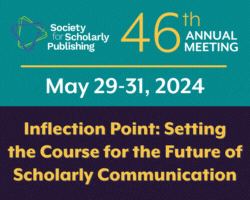Open Peer Review
The Open Peer Review roundtable went well. We had a full table with a lively discussion, although the consensus seemed to be that no one wanted to go in that direction quite yet. We talked about the topic in a wide context, from the traditional definition (reviewers and authors knowing about each other during the peer review process) to the idea of “open” as an invitation to a wider, nontraditional audience (e.g., pre-publication and/or post-publication reader commentary in place of–or in addition to–formal peer review). We also had a good mix of disciplines including biosciences/medicine, physics, and social sciences/humanities, which was nice to see. –Helen Szigeti, MLS, HighWire Press, Stanford University Libraries
Metrics Roundtable
A metric is an empirical indicator of an abstract construct. That construct may be something like “prestige”, “impact”, or “reputation”. We all understand what these constructs mean, but coming up with a simple metric to measure them is much more difficult. Our roundtables (2 of them) began with a short review of the Impact Factor, before being introduced to the h-factor and the networked-based Eigenfactor. We returned repeatedly to ask ourselves the following questions: what are their strengths, what are their weaknesses, and do each of them give us a different perspective of that elusive construct we seek to measure? –Philip M. Davis, Department of Communication, Cornell University
Free add-ins for Word 2007
For our roundtable, covering the free add-ins for Word 2007 (Ontology add-in, Article Authoring Add-in, and Chem4Word Add-in), most of the discussion centered around two points:
- whether authors would use the Word add-ins to add semantic information to articles
- realization that the add-ins are useful to editors/publishing staff, in addition to authors
On point 1, one of the discussion topics centered around publishers still needing to do the work that they do today in terms of tagging, as not all authors would be on Word 2007 in the short term, and, even when they are, there will be variability in terms of author usage of the new add-ins. The key point that emerged around this:
- Authors that do better on the semantic front, will likely have an edge on making their papers more relevant for search and semantic analysis in the future
- Doing some level of validation within Word with the add-in, prior to submission (and blocking if not compliant), will be useful in driving author behavior
On point 2, many people on the table though of the add-ins as being only for authors, and only after the discussion they realized that the add-ins can be equally useful to the editors and publishing staff, in particular benefiting from the ability to import/export files in the National Library of Medicine XML format into Word 2007. –Pablo Fernicola, Microsoft
Institutional Repository Roundtable
The Institutional Repository table was full of fruitful discussion. We talked about the role IRs play in archiving and preserving access to the intellectual assets of an institution and discussed possibilities for scholarly societies and IRs to collaborate (i.e. societies have content and IRs have infrastructure). Some wondered about the longevity of IRs given institutional budgets and the overall cost required to run and maintain an IR. It was good to hear perspectives from IR managers as well as publishers and those representing societies. –Allyson Mower, J. Willard Marriott Library, University of Utah
Open Access Roundtable
The Open Access roundtable offered lively discussion on this perpetually “hot” topic. We had an interesting mix of participants, ranging from CEOs to a librarian to society staff members. A definition of OA was offered and the genesis of the OA movement reviewed. Some discussion took place around the notion that “free access” does not equate to “no cost”…there IS a cost, and SOMEONE pays…it is a question of whom. The recent NIH mandate was addressed, especially in the context of other funding agencies and what they might be expected to do at some future point. The publishers in the group shared their own OA models; most of us have hybrid models where subscriptions are predominant–although authors can purchase immediate free access for their paper–and where all research content is released within 12 months or so. –Nancy Winchester, American Society of Plant Biologists



Join the Conversation
You must be logged in to post a comment.